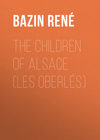Kitabı oku: «The Children of Alsace (Les Oberlés)», sayfa 7
CHAPTER VI
THE FRONTIER
The next day Jean started in the morning on foot to go to the cutting bought by the House of Oberlé, which was situated on the crest of the mountains, enclosing the valley, to the left of the neck of the Schlucht, in the forest of Stosswihr. The way was long – the soil made slippery by a recent shower; besides, Jean lost several hours in going round a great rock he ought to have climbed. The afternoon was well advanced when he came to a wood cabin at the place where the road ended: just the time to talk to the German foreman who directed, under the supervision of the forest administration, the felling and transport of the firs; and the young man, continuing his climb, passed the workmen from the timber-yard coming down before the end of the day, to regain the valley. The sun, still splendid, was about to disappear on the other side of the Vosges. Jean was thinking with a beating heart of the frontier now quite near; however, he would not ask the way of the men who saluted him in passing, for he prided himself on hiding his emotions, and his words might have betrayed him before this gang of woodcutters released from work, and curious at the meeting. He entered the cutting they had just left. Around him the pine-trees, branchless and despoiled of their bark, were lying on the slopes, which they seemed to light up by the whiteness of their trunks. They had rolled – and stopped – one could not see why. At other times they had made a barrier and placed themselves pell-mell like spilikins on a game board. In the high forest there only remained one workman, an old man dressed in dark clothes who, kneeling, tied up in his handkerchief, a store of mushrooms he had gathered. When he had finished tying the ends of the red stuff with his clumsy fingers he got up, pushed his woollen cap well on to his head, and began to descend, with long strides over the moss, his mouth open to the odour of the forests.
"Ah," said Jean, "one minute, my man."
The man between two immense pine trunks, himself the colour of the bark, turned his head.
"Which is my nearest way to get to the neck of the Schlucht?"
"Go down by the waterfall, the way I go, and then turn up again. But do not go up there another two hundred yards, for then you go down into France; you will find paths which will lead you to the Schlucht. Good evening!"
"Good evening!"
The words rang out, soon lost in the vast silence. But one of them went on speaking to Jean Oberlé's heart: "You will go down into France." He was in a hurry to see her, this mysterious France, which held such a large place in his dreams, in his life – she, who had destroyed the unity of his family because the older members, some of them at least, remained faithful to her charms. France, for whom so many Alsatians had died and for whom so many others were waiting and whom they were loving with that silent love which makes hearts sad. So near him – she from whom he had been so jealously kept – she for whom Uncle Ulrich, M. Bastian, his mother, his grandfather Philippe, and thousands and thousands of others said a prayer every night!
In a few minutes he had reached the top and begun his descent on the other side. But the trees formed a thick curtain round him. And he began to run to find a road and a free space to see France. He took pleasure in sliding down and letting himself almost fall, head foremost, seeking the desired opening. On this side of the mountain the sun was touching the earth; here and there the air was still warm; but the pines always made a wall.
"Halt!" cried a man, showing himself suddenly, and coming out from behind the trunk of a tree. Jean went on running some steps – carried away by the impetus. Then he came back to the customs official who had called to him. Then the man, who was a brigadier, young and squat, with defective eyes, a little wild, two locks of yellow hair framing the thick-set face – the real type of a man of the Vosges, looked at the young man and said:
"Why the devil did you run? I thought you were a smuggler."
"I was trying to find a place to see a landscape in France…"
"Does that interest you? You are from the other side?"
"Yes."
"Not a Prussian all the same?"
"No; an Alsatian."
The man smiled slightly and said, "That is better!"
But Jean continued without taking up the conversation, and as if he had forgotten his question, to look at this poor officer of France, his face, his uniform, and to photograph them on his mind. The officer seemed amused at his curiosity and said, laughing:
"If it is a view you are after, you have only to follow me. I have one which the Government offers me to complete my treatment."
They both began to laugh, looking straight into each other's eyes quickly – less for what the customs officer had said than because of a certain sympathy which they felt for each other.
"We have no time to lose," said the brigadier, "the sun is dying down."
They went on under the vault of pines, turning round a cliff of bare rocks on which were planted at some distance two posts marking the spot where Germany ended and where France began, and at the end point, which was like a spur in the green, on a straight platform, which had its bed down in the forest, they found a watch-house of heavy planks of pines nailed on to the beams. From there one could see an immense landscape, which went on and on, sloping down – as far as human eye could see. In this moment and in the setting sun a pale golden light bathed the terraced lands, forests, villages, and rivers, the lakes of Retournemer and Longemer, softening the reliefs, and casting a colour like that of corn on uncultivated lands covered with heath. Jean remained standing, drinking in the picture to intoxication, and kept silence, while his emotion increased. He felt that the whole depth of his soul was full of joy.
"How beautiful it is!" he said.
The brigadier of customs, who was observing him from the corner of his eye, was flattered by the other's unstinted praise of his native district and answered:
"It is tiring, but in summer it is good to walk – for those who have the time. People come from Gérardmer, and from Saint Dié and Remiremont and from farther still. Many people come from over there – "
Over his shoulder, with his thumb reversed and turned backwards, he pointed to the country beyond the frontier.
Jean was shown in which direction lay the three towns of which the Custom House official had spoken. But he only followed his own thought with attention. What delighted him was the clearness of the air, and the idea of the illimitable, of the sweetness of life and of fertility which came to his mind at the sight of the French land. It was all he knew of France, what he had read, and what he had heard his mother, grandfather, and uncle Ulrich talk about, what he had pictured to himself, memories buried deep in his mind, which rose again suddenly like millions of grains of corn to the call of the sun.
The brigadier was seated on a bench, along the side of the hut; he had taken his short pipe from his pocket and was smoking.
When he saw the visitor turn towards him, his eyes full of tears, and seat himself on the bench, he guessed Jean's feelings; for Jean's admiration of the picturesque had escaped him, but the tears of regret at once made the brigadier grave. Those were from the heart, and a sublime equality united the two men. However, as he did not dare to question he stiffened his neck, until the muscles were visible, and began to study the horizon silently.
"What part of France do you come from?" asked Jean.
"About five leagues from here, in the mountain."
"Have you served your time in the army?"
The brigadier took his pipe from his mouth and his hand quickly touched the medal hanging on his breast.
"Six years," said he – "two furloughs. When I left I was a sergeant, with this medal, which I brought back from Tonquin. A fine time when it is finished." He spoke like travellers who prefer the remembrance of a journey but all the same have not disliked it. And he continued:
"With you, they say it is harder."
"Yes."
"I have always heard it said Germany is a great country, but the officer and the soldier are not relatives as in France."
The sun was going down; the great golden landscape became tawny in places and purple in shadow. This purple spread with the rapidity of racing clouds on shadowed slopes and veiled plains – how Jean Oberlé would have loved to see you again in strong light! He asked:
"Do you ever see any deserters?"
Those who pass the frontier before their service begins are naturally not known, only the soldiers serving in the Alsace-Lorraine regiments and who desert in uniform. "Yes; I have seen several poor fellows who had been too severely punished or whose tempers were too proud. You will say that some desert from our side too, and it is true; but then they are not so many – "
Shaking his head and looking tenderly at the sleeping forests:
"When one belongs to this side, you see, one can speak ill of it, but one is not satisfied elsewhere. You do not know the country, sir, and yet to look at you one would swear you belonged to it."
Jean felt himself getting red; his throat was dry; he could not answer. And the man, thinking that he had taken a liberty, said:
"Excuse me, sir; one never knows whom one meets; and it is better not to talk about these things. I must continue my rounds and go down again."
He was going to salute in military fashion; Jean took his hand and pressed it.
"You are not mistaken, my friend," he said.
Then, feeling in his pocket, he held out his cigar-case to him.
"Come, take a cigar!"
And then, with a kind of childish joy, he emptied his case into the hand which the Custom House official held out.
"Take them all; you will give me pleasure. Do not refuse me!"
It seemed as if he wanted to give something to France.
The brigadier hesitated for a moment, and closed his hand over them, saying:
"I will smoke them on Sunday. Thank you, sir! Good-bye!"
He saluted quickly, and was lost to sight almost immediately in the firs that clothe the mountains. Jean heard his footsteps growing fainter in the distance. Above all, he heard echoing in his soul, and with indescribable emotion, the words of this unknown man.
"You belong to us." "Yes, I belong here; I feel it, I see it; and that explains to me so many things in my life."
The shadow descended.
Jean saw the land darkening. He thought of those of his family who had fought there, round the villages submerged by the night, so that Alsace should remain united to that great country stretched out before him. "Sweet country – my country – every one has tender words for her; and I, why did I come? Why am I as moved as if she were living before me?"
In a little while, on the fringe of the sky just where the blue began, rose the evening star. Alone, faint but dominating as an idea.
Jean rose; the night was becoming quite dark, and he took the path which follows the crest of the hills; but he could not take his eyes from the star. Walking all alone in the deep silence, on the summit of the divided Vosges, he said to the star and to the shadow beneath:
"I belong to you; I am happy to have seen you. It frightens me to love you as I do!"
Soon he reached the frontier, and by the magnificent road crossing the Schlucht, went back again into the German-land.
The following day, the Tuesday of Holy Week, he was again at Alsheim, and handed to his father the report he had drawn up. Every one welcomed his return with such evident pleasure that he was very much touched by it. The evening after the "conference" between the old grandfather and the manufacturer, and at which Jean was present, since he had just returned from visiting the cuttings, Lucienne called her brother to the fire before which she was warming herself in the large yellow drawing-room. Madame Oberlé was reading near the window; her husband had gone out, the coachman having informed him that one of the horses had gone lame.
"Well!" asked Lucienne. "What is the most beautiful thing you saw?"
"You."
"No, do not joke; tell me, the most beautiful thing during your journey?"
"France!"
"Where?"
"At the Schlucht. You cannot imagine the emotion it made me feel. It was a shock – like a revelation. You do not seem to understand me."
She answered in an indifferent manner:
"Yes; I am delighted that you were pleased. It ought to be a very fine excursion at this time of the year. The first spring flowers, are there not? And the breeze in the woods? Ah, my dear boy, there is so much convention in all that!"
Jean did not go on. She it was who continued, and in a confidential voice, which she modulated, and made marvellously musical:
"Here we've had grand visits – oh, visits which nearly cost a scene. Imagine, two German officers came last Wednesday in a motor car to the lodge, and asked permission to see the saw-mills. Happily they were in mufti. The Alsheim people only saw two gentlemen like any others. Very fashionable; an old one – a commandant, and a young one with a grand air, and accustomed to society. If you had seen him bow to papa! I was in the park. They bowed to me too, and visited the whole of the works, personally conducted by our father. While this was going on that idiot Victor informed grandfather, who showed he was annoyed when we came in. I ought to have run away, it appears. As the gentlemen did not enter the house – 'my house,' as grandfather says – his irritation did not last long. However, there was a sequel – "
Lucienne laughed a little stifled laugh.
"My dear, Madame Bastian did not approve of me."
"You were then present during their visit to the works, when these gentlemen – "
"Yes."
"All the time?"
"My father kept me. In any case, I do not see how that should affect the Mayor's wife. But I had such a cold bow from her, my dear, last Sunday at the church door. Do you care about the Bastians' bows?"
"Yes; in the same way that I care for the greetings of all good people."
"Good people – yes; but they do not know what life is! To be blamed by them is just the same to me as if I were to be blamed by an Egyptian mummy come to life for the purpose. I should answer: 'You do not understand anything about it; go and wrap yourself up again.' Is it not strange that you do not think as I do – you, my brother?"
Jean stroked the hand which was raised in front of him to make a screen.
"Even mummies can judge of certain things of our time, my darling – the things which are of all times."
"Oh! how serious you are. Come now, where was I wrong? Was it in going for a walk? In not looking away? In answering a greeting? In obeying my father, who told me to come and stay?"
"No; assuredly not!"
"What harm have I done?"
"None. I have danced with many German girls. You can acknowledge an officer's greeting."
"Then I did right?"
"As a fact, yes. But there are so many sorrows around us – real sorrows, and so noble. You must remember that they all come to life again at a word, or a gesture."
"I shall never consider that. Since what I do is not wrong, no one shall ever stop me. Do you hear?"
"That is where we differ, Lucienne. It is not so much in our ideas; it is in a whole range of feelings which your education prevents you from possessing."
He kissed her, and the conversation wandered to different topics.
CHAPTER VII
THE EASTER VIGIL
The weather had settled fine. Jean found the plain of Alsace in full spring glory.
However, he only felt a faint and mixed pleasure in the sight he had longed for. He came back from this excursion more upset than he cared to own to himself. It had revealed to him the opposition of the two nations – that is to say, of two minds, the persistent memory of many of the poor, and the difficulty they found to make a livelihood which their prudent and even hidden opinions created for them. He understood better now how difficult a part his would be to play in the family, at the works, in the village, in Alsace.
The pleasure he felt the morning after his return at his father's congratulations on the report of the forest cultivation by the House of Oberlé made only a short diversion in the midst of this worry. He tried in vain to appear quite happy, and he duly deceived those whose interest it was to be deceived.
"My Jean," said his mother, kissing him as he was going to sit down to breakfast, "I think you look splendid. The strong Alsheim air agrees with you, and also being near your poor mamma!"
"Fancy that!" said Lucienne, "and I thought him very gloomy!"
"Business," explained M. Joseph Oberlé, turning towards the window where his son was sitting, "cares of business. He has handed me a report, on which I must congratulate him publicly; it is very well drawn up, very clear, and the result of which will be that I shall economise, in four places at least, in the transport of my trees. You understand, father?"
The grandfather made a sign with his head. But he finished writing something on the slate, and showed it to his daughter-in-law.
"Has he already seen the country weep?"
Madame Monica rubbed the sentences out quickly with her fingers. The others looked at her, and all were uneasy, as if there had been some painful explanation between them.
Jean again experienced that intimate sorrow for which there is no remedy. All the afternoon he worked in the office at the saw-mills, but he was distracted and dreamy. He reflected that Lucienne would go away one day, and that nothing would be altered; that the grandfather might disappear also, and that the division would still go on. All the plans that he had had when far away, the hope of being himself a diversion, of bringing peace, of uniting them or of giving them an appearance of union: all that appeared childish to him now. He saw that Lucienne had spoken truly when she made fun of his illusions.
No, the evil was not in his family, it was in the whole of Alsace. Even if no one of his name lived at Alsheim, Jean Oberlé would meet at his door, in the village, among his workmen, his clients, and his friends the same annoyance at certain moments, always the same question. Neither his will nor any will like his could deliver his race, either now or later.
In this melancholy mood the idea of seeing Odile again, and making her love him, came back to him and took possession of his mind. Who else besides Odile could make life at Alsheim acceptable to him, and bring back his scattered and suspicious friends, and re-establish the name of Oberlé in the esteem of "Old Alsace"? He saw now that she was more than a pretty woman towards whom his youthful heart went out in song; he saw in her peace and dignity, and the only strength possible in the difficult future which awaited him.
She was the brave and faithful creature whom he needed here.
How to tell her? How to find an opportunity to speak freely to her, without the risk of being surprised, and troubling this orderly and jealous family? Evidently not at Alsheim. Then where should he arrange to meet her? And how could he forewarn her?
Jean thought of this all the evening.
The next day, Maundy Thursday, was the day on which in Catholic churches the Tomb would be decorated with flowers, branches of trees, materials, and torches placed in ledges, where the faithful hasten to adore the Host. It was beautiful weather, clear, even too clear for the time of year, when clearness calls up mist or rain.
After he had talked with his mother and Lucienne in M. Philippe Oberlé's room – it was the first time that he had felt that his home held a family – Jean went towards the orchards, which are behind the houses of Alsheim, and followed the road which he had taken a few weeks ago to call on the Bastians. But a little beyond the Ramspachers' farm he took the path which up to there ran at right angles to the avenue, and was now parallel with it, and with it joined the village road. He came out on to a piece of waste land, used for carts by many farmers on the plain. The neighbouring fields were deserted. The road was partially screened by a bank of earth planted with hazel-trees. Jean walked along the quick-set hedge which ran round the Bastians' property, approached the village, and came back again. He waited. He hoped that Odile would soon come into the path on the other side of the hedge to go to the Alsheim church to pray at the Tomb.
The remembrance of former meetings, at the same place and on the same day, had come into his mind, and had decided him. As he began the walk for the third time he saw what he had not seen at first.
"How wonderful," he said to himself. "The road was made for her!"
At the end of the avenue, for more than two hundred yards in front, the fence, the clumps of trees, a small portion of the long roof appeared in a marvellous frame.
The old cherry-trees had flowered all together in the same week with the almond-trees and the pear-trees. The pear-trees blossom in clusters, the almond-trees in stars; as for the wild cherry-trees, from the forest transplanted to the plain – they blossom into white distaffs of bloom.
Round the substantial branches, swollen and coloured red with sap, thousands of white corollas like a drift of snowflakes, trembled on their fragile stalks, and so thick were they that in many places one could not see the branch itself. Every tree cast its flowery spindles in all directions. So many of the cherry-trees were old that from one side of the avenue to the other the points of the flowering branches touched and intermingled. A swarm of bees covered them with hovering wings. A subtle odour of honey floated in waves down the avenue, and was wafted on the wind far away to the plain, to the fields, to the scarcely covered ground surprised by this feeling of spring. There were no trees in the large open valley which could vie with these for splendour – only to the right – and quite close, the four walnut-trees of the Ramspachers had begun to show their leaves, and seemed with their heavy branches to be enamels encrusting the farm walls.
The minutes passed by – the petals of the cherry-blossoms fell in showers. And lo, here is a woman stooping to unlatch the gate – it is she! She stands erect, and walks onwards in the middle of the path, between its two borders of grass – quite slowly, for she is gazing upwards. She is looking at the white blossoms which are open. The idea of a bride's wedding wreath, an idea so familiar to young girls, passes through her mind. Odile does not smile, only her face beams with an uplifted look, and an involuntary stretching out of her hands gives the greeting and thanks of her youth to the joyous earth.
She goes down towards Alsheim. On her fur cap, on her rounded cheeks, on her blue cloth dress, the wild cherry-trees shed their blossoms. She is serious. In her left hand she carries a prayer book, half hidden in the folds of her skirt. She thinks she is alone.
The splendour of the day speaks to her. But there is nothing languid about her. She is a valiant creature; she is made to face life bravely. Her eyes, which seek the tree-tops, are alive and masters of her thoughts, and do not give themselves up to a tempting dream. She was drawing near, never suspecting that Jean was waiting for her. The meal-time ended, the usual noises were going on in the village of Alsheim, rumbling cart-wheels, barking dogs, voices of men, of children calling to each other, but all softened by the distance, scattered in the vast aerial space, drowned in the tide of the wind, as is the noise of a clod of earth which has become loose and falls into the sea.
As she came near, Jean took off his hat and stood up a little on the other side of the hedge. And she who walked between two walls of blossoms, although she was gazing upwards, turned her head, her glance still full of the spring which had excited her.
"Oh, is that you?" she said.
And she came at once across the strip of grass where the cherry-trees were planted, up to the place in the hedge where Jean was.
"I cannot come to you freely as I used to," he said, "so I came to wait for you. I have a favour to ask of you…"
"A favour? And you say that so seriously!" She tried to smile, but her lips refused. They had both become pale.
"I am going," said Jean, as if he was making a grave declaration; "I am going up to Sainte Odile the day after to-morrow – I shall go to hear the bells ring in Easter. If you also asked for permission to come – "
"You have made a vow?"
He answered:
"Something like it. I must speak to you – to you alone."
Odile withdrew slightly. With something of fear in her look she was trying to find out if Jean was speaking the truth – if she had guessed aright. He was watching her in an agony of anxiety. They were motionless, trembling, and so near and yet so far from each other that one would have said that they were threatening each other. And in fact both felt that the peace of their lives was at stake. They were not children, but a man and a woman of a strong and passionate race. All the powers of their being asserted themselves and broke through the hackneyed commonplaces of custom, because in these simple words, "I must speak to you," Odile had heard the breath of a soul which was giving itself, and which demanded a return.
In the deserted avenue the old cherry-trees lifted their white distaffs of blossom, and in the cup of each flower the spring sun was resting.
"The day after to-morrow?" she said, "at Sainte Odile – to hear the bells ring?"
She repeated what he had said. But that was to gain time, and to gaze deeper into those eyes fixed upon her, eyes which looked like the green depths of the forest.
There was a great calm in the plain and in the next village. The wind ceased for a moment – Odile turned away.
"I will go," she said.
Neither of them explained themselves further. A covered cart rolled along the road, not far off. A man shut the gate through which carts pass to the Bastians' farm. But the great thing was Jean had said what he had to say.
In the profound depths of their souls the words echoed and re-echoed. They were no longer alone. Both had the sacred moment of their meeting enclosed, as it were, in themselves, and they fell back on their own thoughts as the earth in the furrows does when the sowing is done, and the germinating seed is beginning to expand.
Odile went away. Jean admired the healthy and beautiful woman disappearing along the road. She walked well, without swinging her body. Above the white neck, Jean placed in imagination the big black bows of the Alsatian women who live beyond Strasburg. She no longer raised her eyes towards the cherry-trees. She let her skirt trail, and it swept the grass, making a little dust fly, and the petals of cherry blossoms, which flew about a little in the wind before dying.
The day after to-morrow was slow in coming. Jean had said to his father:
"Some pilgrims are going up to Sainte Odile on Saturday to hear the Easter bells. I have never been there at this time. If you do not mind, it is an excursion I should much like to make."
He did not mind.
Jean opened his window when he woke that morning. There was a thick fog. The fields near the house were invisible.
"You will not go in this weather?" asked Lucienne, when she saw her brother come into the dining-room, where she was drinking her chocolate.
"Yes, I shall go."
"You will see nothing."
"I shall hear."
"Is it then so extraordinary?"
"Yes."
"Then will you take me?"
She did not wish to go to Sainte Odile. Dressed in a light morning-gown trimmed with lace, and drinking her chocolate in little sips, she had no intention whatever of doing anything but stop her brother on his way and kiss him.
"Seriously, are you making a kind of pilgrimage up there?"
"Yes – a kind of – "
Bending at this moment over her cup, she did not see the quick smile which accompanied the words. She answered a little bitterly:
"You know I'm not devout. I fulfil my obligations as a Catholic but poorly, and the practices of devotion do not tempt me. But you, you have more faith than I have. I am going to tell you what you ought to ask for – it will be worth a pilgrimage, I can tell you." She changed her tone, and her voice became suddenly passionate; she raised her eyebrows, her eyes were at once self-willed and affectionate, and she said:
"You must ask for that miracle of perfection among women who will live with you here. When I am married and go away life will be terrible for you here. You will have to bear all alone the misery of the family quarrels, and the suspicions of the peasants. You will have no one to pity you. That is the part to play. Ask for some one strong enough, gay enough, and with a conscience fine enough to do it, since you would live at Alsheim. You see, my thought is that of a friend."
"Of a great friend."
They kissed each other.
"Good-bye, Pilgrim, good-bye – good luck!"
"Good-bye."
Jean got away. He was soon in the park, turned after passing through the gate, went through the hop-fields and the vineyards, and so into the forest.
The forest was also full of mist. The serried masses of pines, which took the hill as it were by storm, appeared grey from one bank of the stream to the other, and were almost immediately lost in a thick mist without sun and without shadow.
Jean did not go up the beaten track. He went gaily climbing up the woods when not too steep, and stopping sometimes to take breath and to listen if he could not catch above as below, somewhere in the mysterious and impenetrable mists of the mountain, either the voice of Odile or the chant of the pilgrims. But no; he only heard the rushing of water, or perhaps the voice of some one calling to his dog, or the timid call of some poor peasant of Obernai picking up dead sticks with his child, in spite of the regulation which allows wood-picking only on Thursdays. The saucepan must boil on Easter Sunday! And was not this fog which hid everything a divine protection against the forest guard?
Jean experienced great pleasure from this solitary, stiff climb. As he went up he thought of Odile more and more, and he was more and more glad that he had chosen this holy place of Alsace in which to meet her – and this day – doubly affecting. Everywhere around him the beautiful scalefern which carpets the rocky slopes unfolded its velvet fronds. On all last year's shoots of honeysuckle there were little leaves; the first strawberries were in flower, and the first lilies of the valley. The geraniums, which are so fine in Sainte Odile, lifted their hairy stalks, and the multitude of whortle berries and bilberries and raspberries, that is the entire undergrowth, whole fields of it, began to pour out on the breeze the perfume of their moving sap. The fog retained these few scents and kept them in like a net work on the sides of the Vosges.










